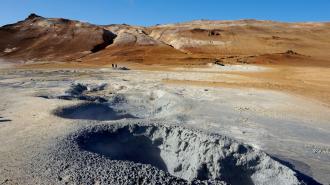Space isn’t as spacious as it should be; it’s full of space debris, small amounts of scrap, trash, and machinery that humans have abandoned to Earth’s orbit. The ISS has cataloged about 500,000 of these small pieces and they hurtle around our planet at about 15,000mph. Or 14.17 g-force. Or 24,140kph.
An anonymous user on Reddit, who claims to work in the aerospace field, posted an image of what a 1/2oz of space debris can do to a block of solid aluminum. This test was done by a light-gas gun in close quarters and shows how much damage even a tiny amount of space debris can do:
Pretty scary, huh? It should be noted that although this looks enormous, the crater is about 5 inches deep. Having said that, it’s caused by something about the size and weight of an eraser on the end of a pencil.
The ISS (International Space Station) is about the size of a football field, and thus an easy target for space debris. To solve this, it has to move its orbit to make sure it doesn’t get hit. Every once in a while, the ISS gets hit by pieces the size of a paint chip and the crew need to repair the ship for weeks.
What’s that? Do you want another interesting space debris fact? Well, during the height of the Cold War in 1965-1967, the U.S. fired hundreds of thousands of tiny needles into space to try for what could best be described as high-powered radio signals. This, however, didn’t work nearly as well as planned and the needles just clumped together into groups — turning these needles into high-velocity projectiles. Fifty years later, there are about 38 of these clumps still in orbit, although sometimes they enter Earth’s atmosphere and burn up.
This article was reprinted with permission of Big Think, where it was originally published.
